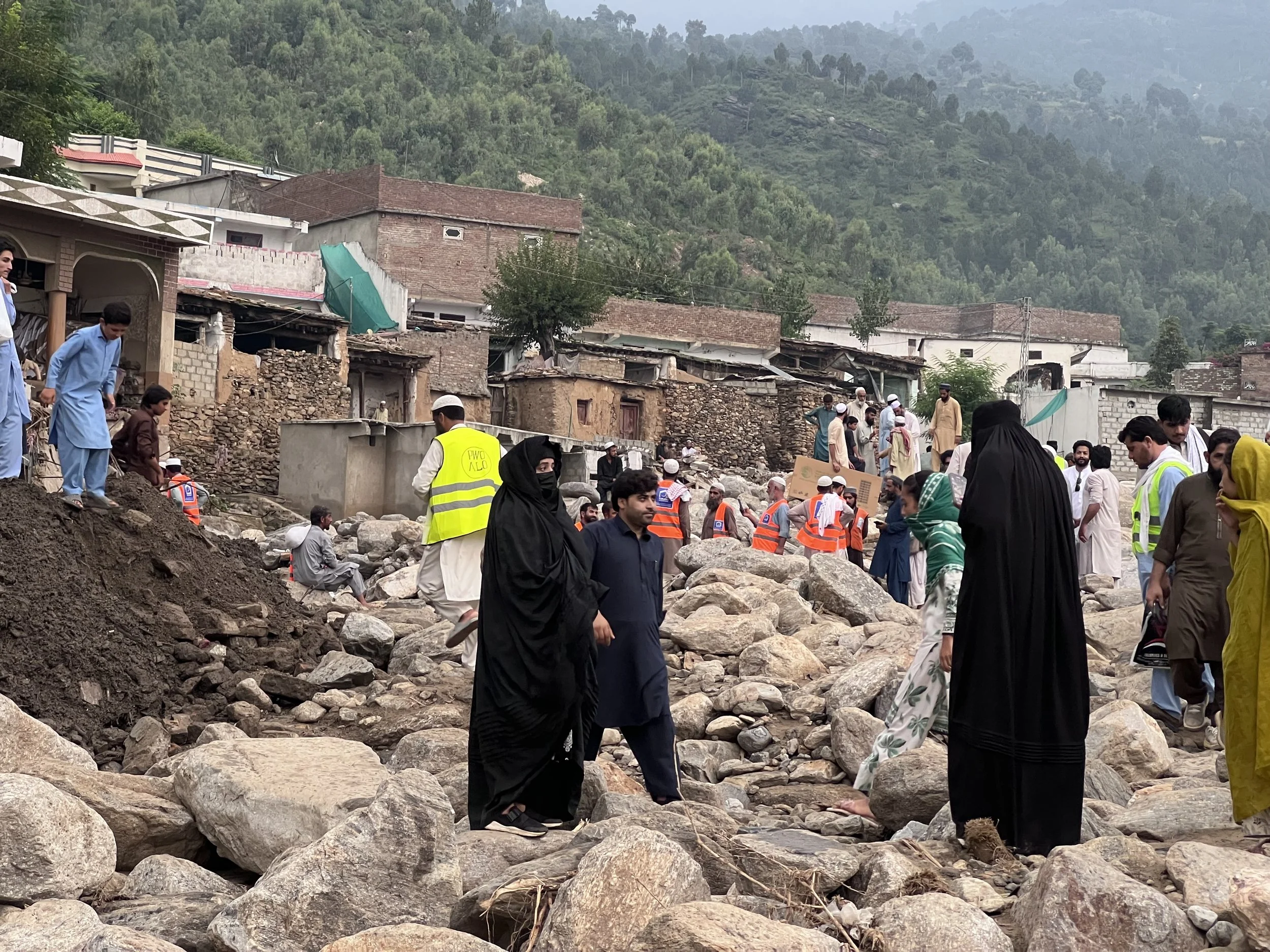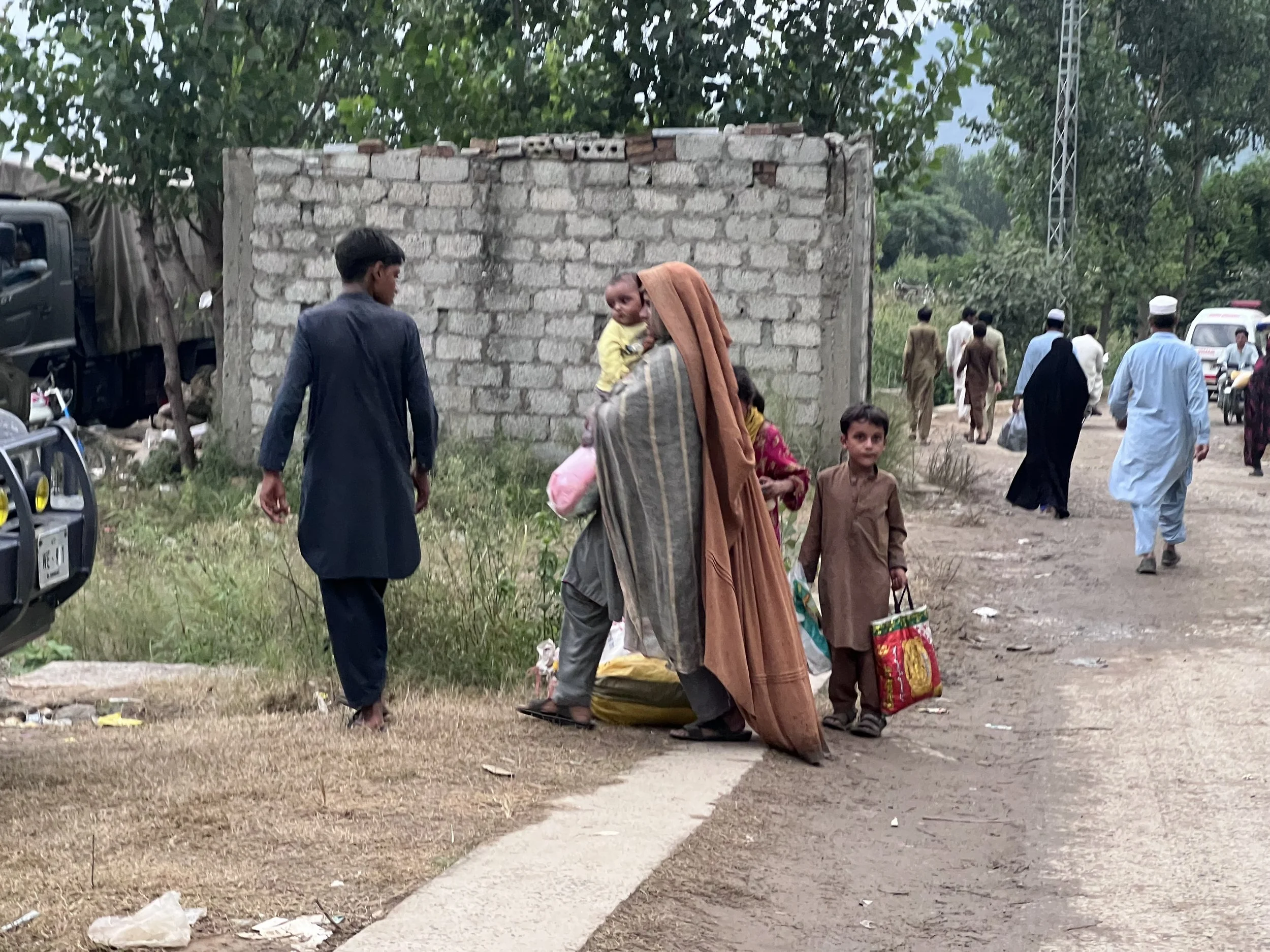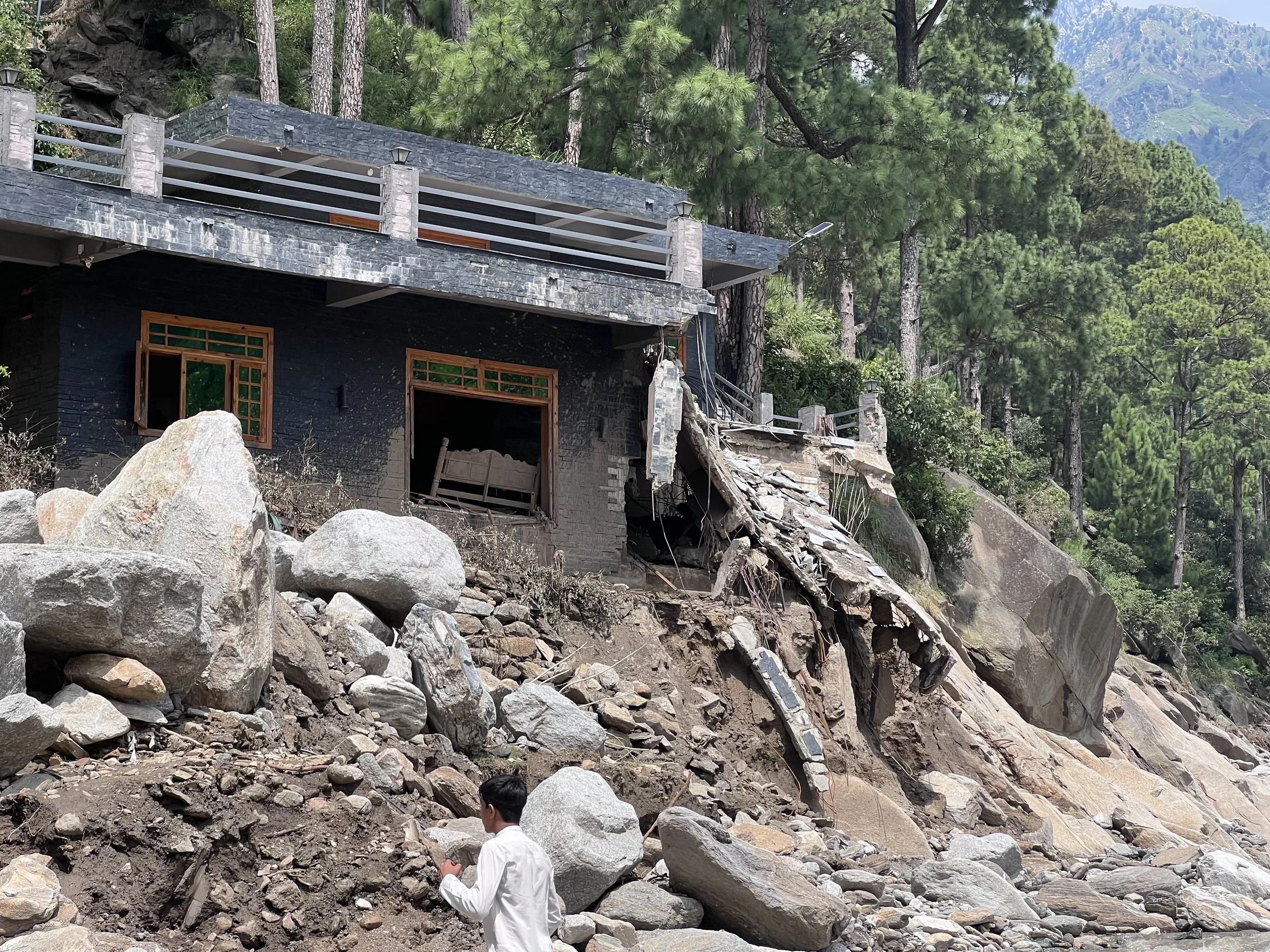Women Struggle for Reliable Healthcare After Pakistan’s Floods
Locals move through damaged infrastructure after a spell of torrential rains and flash floods in Buner, Khyber Pakhtunkhwa province. Credit: Jamaima Afridi for More to Her Story
Pakistan’s devastating floods have displaced thousands, destroyed homes and crops, and left more than 800 people dead since late June, according to the National Disaster Management Authority. The province of Khyber Pakhtunkhwa has borne the heaviest toll, with nearly half of all fatalities, including 238 in the district of Buner alone.
In one of Buner’s hardest-hit villages, Bar Gokand, 18-year-old Azmat faces the terrifying prospect of giving birth without medical care. After miscarrying her first child, Azmat told More to Her Story the only road to the nearest hospital has been washed away.
“I’ve lost one child already. What if something happens to me or my baby?” she said.
For women like Azmat, reaching even the closest Basic Health Unit (BHU) can mean hours of perilous travel — sometimes carried on charpoys (woven rope beds) for hours, sometimes on the shoulders of neighbors — through terrain now cut off by floodwaters. Women and newborns are among those most vulnerable in this crisis, yet they remain among the least visible in relief efforts.
Homes, crops, and infrastructure have all been damaged, and the anticipated economic damages are in the billions, with women the most disproportionately affected by the disaster, especially those who are pregnant or have recently given birth.
A woman carries her children in Buner, Khyber Pakhtunkhwa province. Credit: Jamaima Afridi for More to Her Story
Farangis Azim, who is Assistant Commissioner of Buner and is supervising relief efforts in the flood-hit areas, said emergency response teams have yet to specifically address women’s emergency needs, as well as those of pregnant and post-partum women. She added that although some organizations have shown interest in addressing menstrual hygiene needs by providing menstruation kits, such assistance has not yet been provided.
“The women in the community had shared and reported multiple problems, including illness, hygiene, nutrition, washroom facilities, and limited access to prenatal and postnatal care, yet this aspect has not yet been addressed explicitly by anyone.” said Farangis.
Mahawari Justice is one of the few organizations addressing women’s menstruation, hygiene, and related health issues in flood-affected regions. Co-founder Bushra Mahnoor says women — especially those who are pregnant or have recently given birth — are among the most vulnerable. Limited mobility and the difficulty of evacuation have only deepened their risks.
“Our workers on the ground in Swat have informed us that several women miscarried as a result of the entire situation. These incidents are just a few examples; many more women are struggling silently without any support. The lack of support for these women is alarming,” Mahnoor said.
She noted that pregnant women “find it extremely difficult to travel great distances in order to receive medical assistance. Miscarriages, uncontrollable bleeding, and nutritional issues are common among women. There is an urgent need for specific assistance to address their needs.”
According to Mahnoor, the organization’s main focus is postnatal and menstrual care, but its limited resources make it challenging to reach every woman in need. “We’re doing what we can, but it’s not enough; more organizations and groups need to work on this issue.”
Nahid Khan, a healthcare professional who is working at a mobile medical camp, said that many women are seeking help for postpartum care needs and pregnancy-related issues. But the camp can only offer basic medical care, and people with more complicated requirements are referred to hospitals, which can be challenging in most cases to get to because of bad road conditions.
“Most of the time, we are unable to access some locations when the roads are damaged. I have seen many such women arrive at our camp in extremely difficult circumstances from those areas, but unfortunately, we are only able to provide them with painkillers. There's just not enough support these camps can offer to such women.” Nahid said.
Homes, crops, and infrastructure have been damaged in and around Buner, Khyber Pakhtunkhwa province. Credit: Jamaima Afridi for More to Her Story
Beshonai village in Buner was severely affected by the floods, with 90 percent of it swept away by the flood according to locals. About 80 to 90 houses, primarily farming families, were badly impacted by the flooding. Roughly half of the homes were totally demolished, while the remaining ones were left uninhabitable. In one of the few remaining homes, several women sat together, including 20-year-old Hasna, whose sister-in-law Sana, 21, recently gave birth to a three-month-old daughter.
Hasna said Sana’s family lost nine members in the disaster, and described that day as the most traumatic and painful experience that no one can even imagine.
“This woman is expecting her second child and lost her husband in the flood because of rescuing them,” Sana said, motioning to Hasna. “We are extremely worried about her health because she hasn't cried or spoken since the incident.”
Despite their grief, Sana said the family feels they have little choice but to endure. “She is pregnant, I have a baby, and we are dealing with a lot of problems and complications because of our health conditions. But we are aware that we have to endure this. In these difficult situations, how can we even think about putting our needs first?”
Adnan Khan, a climate expert and a climate action program manager at the nonprofit Pak Mission Society, said that over the long term, these compounding shocks risk entrenching inequality. Women, children, and marginalized groups remain disproportionately affected, facing reduced access to healthcare, protection, and livelihoods. Climate migration may accelerate, as families forced to leave flood-prone areas move to already crowded cities, where urban flooding and inadequate services create new layers of vulnerability.
He further added, “The most pressing challenges included unsafe or inaccessible maternal care, shortages of clean delivery kits, and a lack of menstrual hygiene supplies. Women and girls also faced heightened risks of gender-based violence in overcrowded shelters, along with the psychological strain of displacement. At the same time, women’s livelihoods, often small-scale and informal, were disrupted, leaving many without income while still bearing the burden of caring for children and the elderly.”
Mahnoor stressed that climate change, deforestation, cloudbursts, and glacier melting are all interconnected problems that demand urgent attention.
“Even though many people recommend focusing on the crisis, it's crucial that we address the root problem. We witnessed a devastating flood in 2022, and now, in 2025, we are witnessing yet another instance of people suffering while the government does nothing,” she said.
Mahnoor further stressed the importance of holding those in power responsible for their part in accelerating climate change and calling out the individuals, groups, international leaders, and authorities who are responsible for this destruction, especially considering how women and children are disproportionately impacted but continuously ignored.
“No progress, no alert system, just the deaths of people who are constantly affected, even if they don't have a major contribution in these disasters,” she said.




